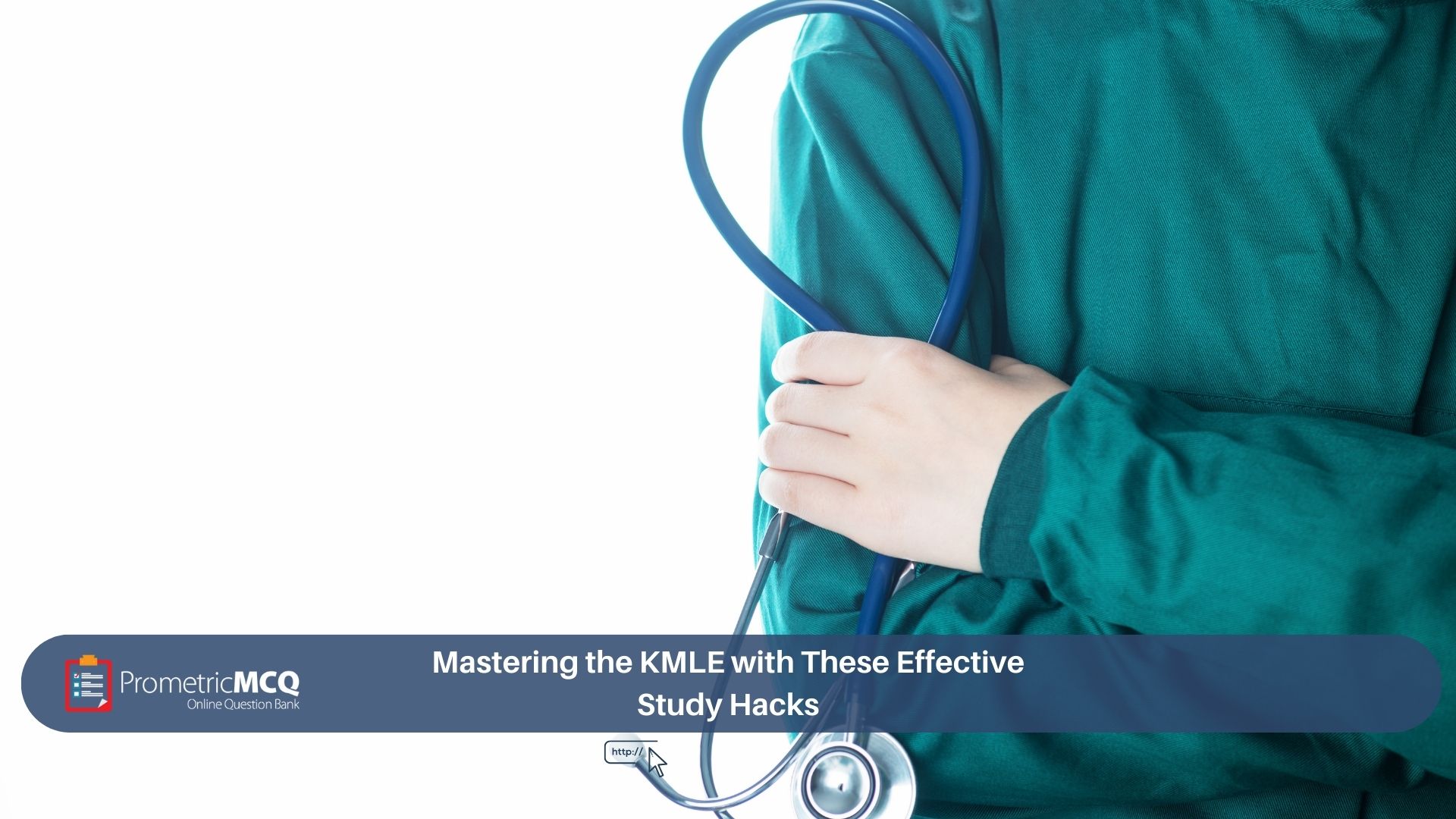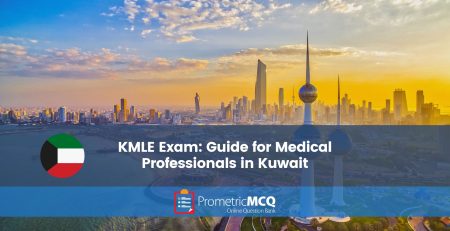
Mastering the KMLE with These Effective Study Hacks
fatima@prometricmcq.com2025-09-24T15:20:20+00:00Table of Contents
ToggleMastering the KMLE with These Effective Study Hacks (2025)
The Kuwait Medical Licensing Examination (KMLE) is the essential, career-defining hurdle for every healthcare professional aspiring to practice in Kuwait. It’s a comprehensive, high-stakes exam designed to validate your clinical competence against rigorous international standards. Faced with a vast syllabus and a challenging format, many candidates fall into the trap of studying hard, but not smart. They spend countless hours passively re-reading textbooks and highlighting notes, only to find that the information doesn’t stick and their practice scores don’t improve. This leads to burnout, anxiety, and a feeling of being overwhelmed.
But what if there was a better way? What if you could replace inefficient cramming with science-backed learning techniques that maximize retention and boost your performance? “Study hacks” aren’t about finding shortcuts or cheating the system; they are about leveraging the principles of cognitive science to learn more effectively in less time. They are about transforming your study sessions from a passive review into an active, engaging process that builds deep, lasting clinical knowledge.
This ultimate 2025 guide is your masterclass in studying smart for the KMLE. We will move beyond generic advice and provide a deep dive into powerful, evidence-based study hacks, including active recall, spaced repetition, the 80/20 rule, and effective time management techniques. This article is your strategic toolkit, complete with a detailed 10-point FAQ to help you build a personalized, efficient, and unstoppable preparation plan for any KMLE exam, whether you’re a doctor, dentist, nurse, or pharmacist.
Key Study Hacks for KMLE Mastery
- Embrace Active Recall: Ditch passive re-reading. Constantly test yourself with flashcards, practice questions, and by explaining concepts aloud.
- Leverage Spaced Repetition: Use tools like Anki to review information at scientifically determined intervals, forcing it into your long-term memory.
- Apply the 80/20 Rule: Identify the 20% of high-yield topics (e.g., Internal Medicine for GPs, Oral Pathology for Dentists) that will account for 80% of your exam score and focus your energy there.
- Make Your QBank Your Primary Tool: Shift your mindset from “learning then testing” to “learning *by* testing.” Use a high-quality question bank as your main study resource.
- Use the Pomodoro Technique: Study in focused, 25-minute intervals with short breaks to maintain peak concentration and prevent mental fatigue.
Hack #1: The Mindset Shift – From Passive Spectator to Active Learner
The single biggest mistake candidates make is engaging in passive study. This includes re-reading chapters, highlighting text, and re-watching lectures. While these activities feel productive, they create what cognitive scientists call the “illusion of fluency”—you become familiar with the material but haven’t truly learned it. The antidote is active recall.
Active Recall: The Cornerstone of Effective Learning
Active recall is the process of actively retrieving information from your memory. Every time you force your brain to recall a fact, you strengthen the neural pathway to that information, making it easier to remember in the future. This is scientifically proven to be far more effective than passively reviewing the same information.
How to Implement Active Recall:
- The QBank Method: The most powerful form of active recall is doing practice questions. Every single MCQ forces you to retrieve information and apply it to a clinical scenario. This is the core of an effective KMLE exam preparation strategy.
- The Feynman Technique: After studying a topic (e.g., management of DKA), close your book and try to explain it out loud in simple terms, as if you were teaching a new student. The areas where you stumble are your knowledge gaps.
- Flashcards (Digital or Physical): Create flashcards with a question or clinical term on one side and the answer on the other. This forces you to recall the information before flipping the card over.
Spaced Repetition: Hacking Your Memory
Your brain is programmed to forget information over time (the “forgetting curve”). Spaced repetition is a technique that combats this by having you review information at increasing intervals. You review a concept just as you are about to forget it, which interrupts the forgetting process and embeds the information deeper into your long-term memory.
How to Implement Spaced Repetition:
- Use an SRS App (Anki): Anki is a free, powerful flashcard app that uses a sophisticated Spaced Repetition System (SRS) algorithm. When you get a card right, it shows it to you less frequently. When you get it wrong, it shows it to you more often. This is incredibly efficient.
- The “Mistake Log” Method: Create a document or notebook where you write down every concept from a QBank question you got wrong. Review this log daily, then every three days, then weekly.
According to a study in the journal *Psychological Science in the Public Interest*, practice testing (active recall) and distributed practice (spaced repetition) are the two most effective study techniques. Learn more about these methods from authoritative sources like the American Psychological Association.
Hack #2: The 80/20 Rule – Hacking the KMLE Syllabus
The Pareto Principle, or 80/20 rule, states that for many events, roughly 80% of the effects come from 20% of the causes. In exam preparation, this means that approximately 80% of your score will come from just 20% of the syllabus topics. Your mission is to identify that critical 20% and focus the majority of your energy there.
How to Identify High-Yield Topics:
- Analyze the Blueprint: For any profession, some domains are more heavily weighted. As covered in our KMLE GP guide, Internal Medicine can be over 50% of the exam. For nurses, Med-Surg and Fundamentals are key. For dentists, Oral Pathology and Operative Dentistry are crucial.
- Look for “Zebras vs. Horses”: The KMLE tests for competence in a general setting. It will focus on common and critical conditions (“horses”) far more often than rare diseases (“zebras”). Master the presentation and management of diabetes, hypertension, asthma, MI, and common infections.
- Use Your QBank Analytics: A good question bank will provide performance analytics, showing which subjects and systems you are weakest in. This data is gold. Use it to guide your focused review sessions.
Hack #3: QBank Supremacy – Hacking Your Primary Study Tool
The single most important study hack is to change your relationship with your question bank. Stop thinking of it as an assessment tool to be used *after* you study. Instead, make it your primary *learning* tool.
How to Learn with a QBank:
- Start with Tutor Mode: In the beginning, do small, untimed blocks of questions in “tutor mode,” where you see the rationale immediately after answering. This allows you to learn the content and the question style simultaneously.
- Read Every Rationale: The real value of a QBank is in the explanations. You must read the rationale for the correct answer *and* for all the incorrect distractors. This is where you learn the nuances that separate the “good” answer from the “best” answer.
- Create Flashcards from Questions: When you encounter a fact or concept you didn’t know in a rationale, immediately create an Anki flashcard for it. This integrates active recall and spaced repetition directly into your QBank workflow.
- Transition to Timed Mode: As you get closer to the exam, switch to creating timed, random blocks of questions to simulate the exam’s pressure and improve your pacing.
This approach, centered on a high-quality resource like a dedicated MCQs Package, is the fastest way to build exam-specific clinical reasoning skills.
Frequently Asked Questions (FAQs) on KMLE Study Hacks
Quality over quantity is the golden rule. It’s better to have 3-4 hours of focused, active study using these hacks than 8 hours of passive, distracted reading. Use the Pomodoro Technique to structure your sessions and prioritize consistency over cramming.
These hacks are perfect for busy professionals. Use “dead time” (like a commute) to do Anki flashcards on your phone. Dedicate just 1-2 focused Pomodoro sessions (25-50 minutes) each evening to a block of QBank questions. Consistency, even in small amounts, is key.
This usually means you are not reviewing effectively. Are you creating a mistake log? Are you reading every word of every rationale? The goal isn’t just to see the right answer but to understand the entire clinical concept so you can answer any future question on that topic correctly.
A combination is best. Start with subject-specific blocks to build your foundation in one area. As you progress, switch primarily to random, mixed blocks. The real KMLE is a random mix of all subjects, and this type of practice trains your brain to quickly switch between different clinical topics, just as you’ll have to on exam day.
The Pomodoro Technique is an excellent anti-procrastination tool. The idea of studying for “4 hours” is daunting. The idea of focusing for just “25 minutes” is very manageable. Start with one Pomodoro, and you’ll often find you build momentum to do more.
This is a perfect use case for spaced repetition with Anki. Create flashcards for the top 50-100 most common lab values and drugs you need to know. Reviewing them daily with an SRS algorithm is far more effective than trying to rote memorize a list.
Listen to your body. Burnout is the enemy of effective learning. Take a full day off—completely guilt-free. Do something you enjoy that has nothing to do with medicine. A rested brain learns and retains information far more effectively than a fatigued one. Schedule your breaks just as you schedule your study sessions.
Only if they are active notes. Don’t copy from a textbook. Instead, create a “mistake log” from your QBank or use the Feynman Technique to write summary sheets in your own words. This transforms note-taking from a passive to an active learning exercise.
A good, concise review book can be helpful to provide structure. However, your second most powerful resource should be a digital flashcard app like Anki, which you populate with content from your QBank reviews.
These principles of cognitive science are universal. The specific high-yield topics will change (e.g., a nurse focuses on prioritization, a dentist on oral pathology), but the methods of learning—active recall, spaced repetition, and the 80/20 rule—are equally effective for acing any knowledge-based professional exam, including the KMLE Dental Exam or nursing exam.
Conclusion: Study Smarter, Not Harder
The Kuwait Medical Licensing Examination is a marathon, not a sprint. The candidates who succeed are not necessarily those who study the longest hours, but those who study the most intelligently. By abandoning inefficient, passive techniques and embracing a strategic approach built on the principles of active recall, spaced repetition, and targeted, high-yield learning, you can optimize your preparation. These study hacks will not only improve your KMLE score but will also reduce your stress, prevent burnout, and build a deeper, more lasting foundation of clinical knowledge that will serve you throughout your career in Kuwait.
Ready to Put These Hacks into Action?
Our comprehensive MCQ packages for the KMLE are designed to be your primary study tool. With thousands of high-yield clinical scenarios, detailed rationales, and performance analytics, you have everything you need to study smarter and ace your exam.










